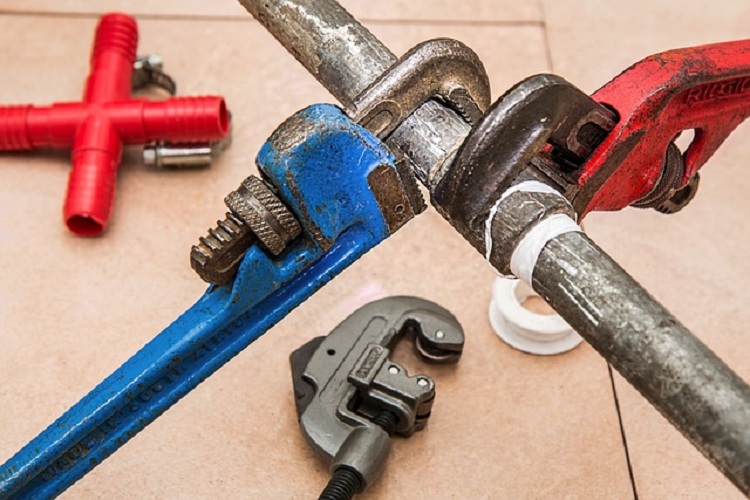Noisy pipes are a phenomenon that can make a home sound like a haunted house – and not in a fun way.
The problem is made bigger by the overwhelming sprawl of the plumbing system. It’ll have you pressing your ear against all the walls, taking up all your time as you look for sounds or signs of where the source might be. Some might even be tempted to move out.
However, before doing anything drastic, try some of these strategies first. Chances are you will start to understand the problem better and find a possible solution.
High water pressure
This can be one possible culprit behind such sounds. When cold water is pumped at high speeds, it rumbles throughout the metal interior of pipes. Since cold water is denser than hot water, the noise is exacerbated.
Sometimes this pressure causes a shockwave when the valve is closed suddenly. This is an occurrence that we’ll delve into it below.
Water hammering
Probably the loudest sounds are caused by precisely when this occurs.
When you abruptly shut off the water valve, high-pressure H2O travelling at high speeds crashes and creates a shockwave that bangs, thuds, and knocks.
Avoiding this is simple – just remember to turn the water off slowly. However, why settle for this when you can fix the reason this whole thing happens in the first place?
Installing a pressure regulating valve (PRV) will offer consistency and prevent momentum buildup, subsequently eliminating those crashes.
Additionally, water hammer arrestors tackle the problem in a different way (by absorbing the shock of the crashing water). Both are equally effective.
If it’s present, fixing an air bubbles issue can also alleviate water hammering because the air chambers can cushion the high-pressure water.
Loose fittings in your plumbing
A plumbing system’s many components and accessories must be securely and tightly installed. Loose valves, pipe connection fittings, and bolts can amplify the processes that occur in the network.
This reveals a multitude of noises that can be related to different parts of the plumbing. Use a wrench and screwdriver to ensure these components are properly tightened.
Remember that the problem could be that some of them are worn out and must be replaced. A used-up washer or damaged valve will not only reveal noises through ineffective sealing but could even cause leaks.
Moments like these are why keeping your plumbing system design layout is super helpful. You’ll have an idea of where everything is, and the task won’t feel so daunting.
Air bubbles may be the reason
Air is used to regulate pressure which essentially prevents these noises from occurring. Eventually, water can start filling up these air chambers thusly failing at cushioning or regulating the water pressure.
Air bubbles or pockets naturally produce a bubbling noise but often rumble and hiss as well. Fixing that is usually easy. Just shut off the water valve, turn on your taps and faucets, and wait a while. All the water in the chambers will have depleted.
Copper pipes
Their hard metal surface can amplify the movement occurring within. Echoes of water thrashing and banging can sound throughout the entire network.
Homeowners rely on those pipes for their hardness, but the malleability of copper means it can contract and expand in response to the varying temperatures of the water.
In theory, this isn’t necessarily a drawback, but the change in size can alter the original fittings and joints attached.
For these noises, insulating the pipes with rubber foam can be effective. It’s either that or replacing the copper pipes with a more discreet material if the sounds bother you too much or if you plan to sell your home fast.
A faulty main shutoff valve
This could cause noises since it might not open or close completely as it used to due to it becoming worn out. Replacing it is an inexpensive and effective solution. Try shutting off the water supply from the mains outside your home.
However, if that isn’t an option, you must replace the valve as soon as possible to avoid a leak inside your property.
Blockages and sludge might require a plumber
Sludge can cause many problems in plumbing, and it’s one of the worst things to deal with.
Sediments travel around with the air and water in pipes, bouncing all over and eventually building up in larger chunks. The impact of the growing debris damages the walls of pipes and causes blockages.
There are some available tools for this case, such as drain snakes and cleaners. While they might get the job down, the sludge likely ventured deep into the plumbing system, rendering these tools futile due to insufficient reach.
A professional plumber is best qualified and well-equipped to handle this situation.
One caveat, though. Never pour chemical drain cleaners down the pipes in an attempt to fix the issue. That can have catastrophic consequences that can worsen the problem and cause quite a bit of money to repair.
Try your best with conventional tools, but if they don’t work, save yourself the trouble and call an expert instead. Remember, fixing the problem will not only give you peace of mind but increase your property’s value, which is important if you plan to sell your home soon.
Worn-out appliances
The source of the noises can exist outside of the plumbing network.
Worn-out appliances such as older washing machines likely have loose components jumbling around and causing a racket. It’s possible to bring out the tools and double-check the security of the nuts and bolts around those components.
It should be easy if they’re reachable, but it might not necessarily fix the issue. A plumber or appliance technician will have the right tools and skills for this. If the issue is severe, it might be time to replace those appliances.
Conclusion
By now, you have a better idea of how you can stop these noises from disturbing your peace. In summary, noises range and differ because they have various causes.
We know banging and knocking is likely caused by water hammers, squealing and hissing by worn-out water valves and loose fittings, and rumbling and bubbling from air bubbles.
However, diagnosing this problem is not so simple without thoroughly understanding your plumbing system’s specifics. And a reliable plumber is the best choice should all DIY techniques fail.

